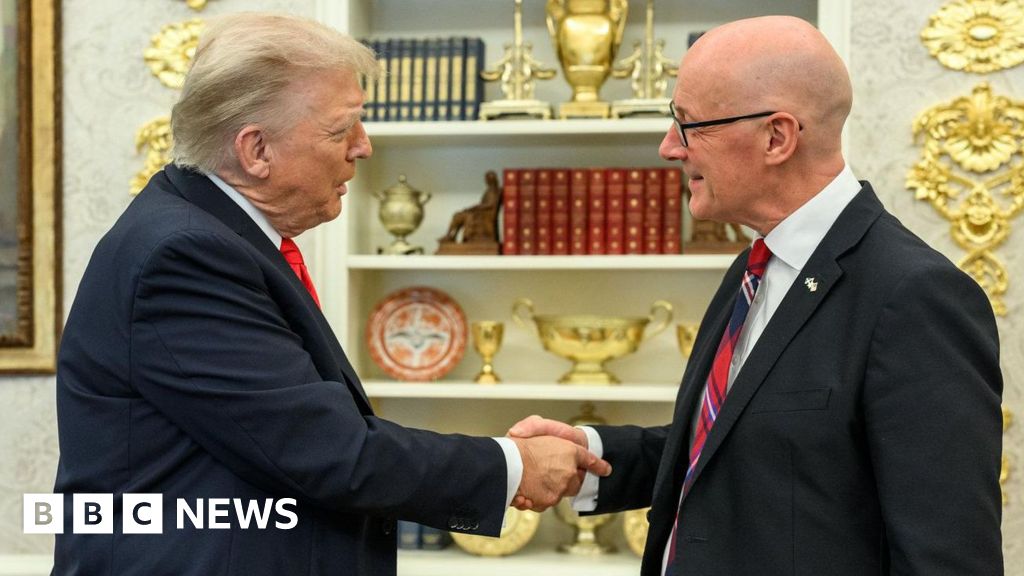Glenn CampbellScotland political editor
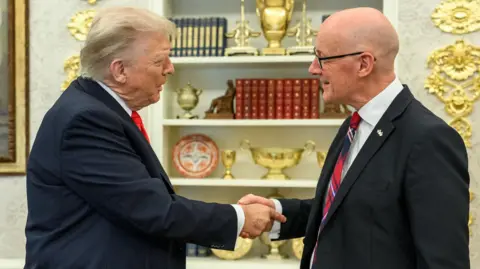 The White House
The White HouseJohn Swinney and Donald Trump remain at odds on a whole range of issues – but something has fundamentally changed in their relationship.
On Wednesday, Scotland’s first minister will don his sharpest evening wear to attend a State banquet at Windsor Castle in honour of the US president.
Six months ago there seemed little chance that the SNP leader would have anything to do with President Trump’s second state visit to the UK.
In early March, Swinney said it was “unthinkable” the trip should go ahead following the Oval Office ambush of Ukraine’s President Volodymyr Zelensky.
Trump has since lifted a pause on the US supply of weapons to Ukraine but his commitment to its defence against Russia remains in question.
Swinney also criticised the Trump plan to take over Gaza and develop the coastline into a Riviera of the Middle East style resort, saying it would amount to “ethnic cleansing”.
But now he is set to join Prime Minister Sir Keir Starmer and Conservative leader Kemi Badenoch at the Windsor banquet.
Why has John Swinney’s approach changed?
The event has been boycotted by Liberal Democrat leader Sir Ed Davey in protest over US policy on Gaza, and Scottish Greens co-leader Ross Greer has urged Swinney to join the boycott.
Swinney will be the only devolved first minister to attend. The Northern Ireland executive is being represented by DUP deputy first minister Emma Little-Pengelly.
The Labour first minister of Wales, Eluned Morgan, has politely declined the King’s invitation in order to lead tributes to a deceased political colleague in Cardiff.
Reform UK’s Nigel Farage has not been invited.
So what has changed to alter John Swinney’s approach?
That was a question I put to him at a news conference in Edinburgh last week and his answer was fairly opaque.
“We’ve just got to get on with the world as we see it and as it is in front of us,” he said.
He was just off a plane from the United States, where he had been granted extraordinary access to the Oval Office to make the case directly to President Trump for the reduction or removal of US import tariffs or taxes on Scotch whisky.
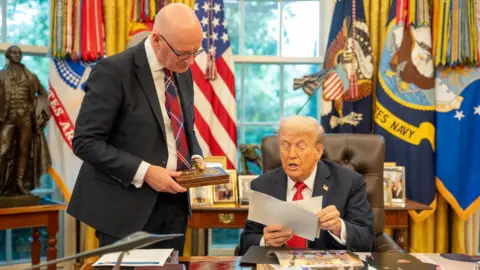 Scottish government
Scottish governmentThis is a pragmatic first minister who has clearly decided to engage with the US president where he sees an opportunity to influence his thinking, especially if it could benefit the Scottish economy.
That does not prevent him from speaking up on issues of concern like Ukraine and Gaza, although he may need to be more diplomatic in how he makes those interventions.
That is essentially the approach that Sir Keir Starmer has taken and he has managed to secure lower tariffs for UK produce entering the US market than those faced by other countries, including EU member states.
UK negotiators have been working ahead of the state visit to secure further concessions on trade and Swinney has seized the opportunity to contribute to that effort on behalf of Scotch whisky.
But given that trade is a UK government responsibility, not one for the Scottish government, how has he managed to get to the heart of the action?
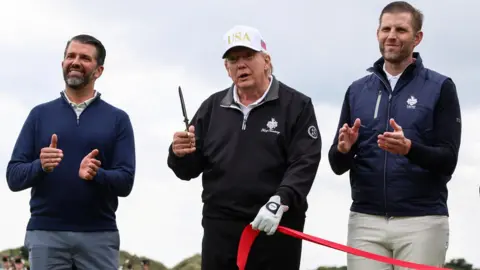 Reuters
ReutersDonald Trump had a huge fallout with Alex Salmond when he was first minister over the Scottish government’s support for offshore wind.
The pivotal moment in changing relations with the Trumps was a meeting between John Swinney and President Trump’s son Eric on Thursday 13 March.
I remember it because it was kept secret in advance and I bumped into the first minister rushing down a back staircase to leave Holyrood after question time that day.
He made no reference to where he was going, why he was in a hurry or why he was avoiding the usual route that would take him past a clutch of news reporters hoping to catch a word.
This meeting was arranged at the request of the Trump Organisation, which has two golf resorts in Scotland at Turnberry in Ayrshire and Balmedie in Aberdeenshire.
Both sides described it as a business discussion and insisted that politics were not mentioned, although the lines between those two spheres have become increasingly blurred since President Trump returned to office.
Building a new relationship
It seems the two most important words spoken at Eric Trump’s meeting with the first minister at his official residence in Edinburgh were “thank you”.
Swinney thanked the Trump family for their investment in Scotland and the Trump team were taken aback because they said no-one in the Scottish government had previously bothered to say these words.
A few months before, Eric Trump had called John Swinney “nasty” for endorsing Kamala Harris in the US presidential election campaign.
It seemed this could now be put aside and a new relationship built.
It may be worth noting that when the Trumps first came to Scotland seeking to build on the protected sand dunes of the Menie estate in Aberdeenshire, it was John Swinney who granted them planning permission, overturning local objections.
He had been their ally in the past and perhaps he could be again.
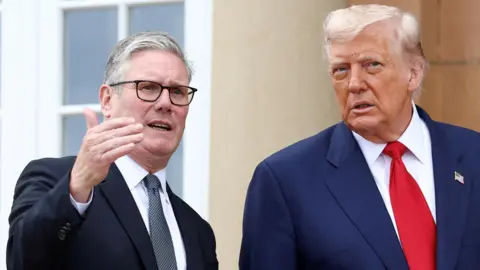 Reuters
ReutersThere is no suggestion that the Trump business has asked for anything specific from the Scottish government.
However, it is a matter of record that Scottish ministers awarded public funds to support a golf tournament to be played at Trump International, as the Aberdeenshire business is officially known.
That was announced in time for Donald Trump’s visit to his Scottish golf resorts in July, which included a dinner with both the prime minister and the first minister in Aberdeenshire.
Swinney had a breakfast meeting with the president the following morning before attending the opening of a new Trump golf course at which Donald Trump praised him as a “terrific guy”.
It was during this visit that Swinney said he took the opportunity to raise concerns about the impact of US tariffs on the whisky industry.
He had heard the president say on arrival in Scotland that he did not realise that whisky was an issue, even though the UK government insists it was among the items on their trade agenda.
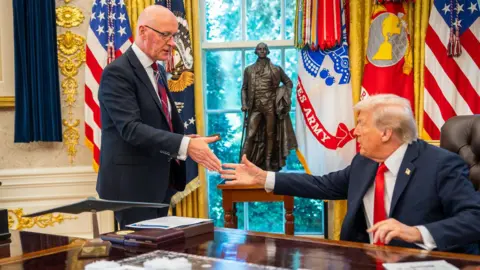 Scottish government
Scottish governmentSwinney suspected steel and pharmaceuticals were higher on the UK’s priority list and made a point of pressing the case for whisky with the president.
He may then have been a little disappointed when Trump played down the extent of their discussion when he spoke to reporters aboard Air Force One on the flight back to America.
But that was not to be the end of their conversation on whisky.
The Scottish government followed up through US diplomats and Swinney decided to fly to Washington to lobby further, accepting an invitation to make his case directly to President Trump in the White House.
He had a 50-minute conversation with the most powerful political leader in the western world.
None of his predecessors as first minister have been afforded that amount of face time. Labour’s Henry McLeish is the only previous holder of the office to have been granted a courtesy call to the Oval Office.
This special access was supported by the then UK ambassador in Washington, Lord Peter Mandelson, before the extent of his past friendship with Jeffrey Epstein brought him down.
Relaxing whisky tariffs ‘a win-win’ deal
While Trump’s Scottish heritage may have helped get Swinney in the door, the first minister said he did not trade on sentiment but instead presented a potential “win-win” business deal to Donald Trump.
The proposal is that by relaxing tariffs on Scotch whisky he would not only ease a burden on Scotland’s national drink but also boost demand in Scotland for used bourbon casks from Kentucky.
A lot of whisky is matured in these second hand barrels and US distillers are working with the Scotch Whisky Association to appeal for a special trading arrangement – zero tariffs on Scotch entering the US and none on bourbon or used casks coming into the UK.
Swinney’s lobbying on this issue could be a political win-win for him too.
If Trump agrees a deal, Swinney will be able to claim a share of the credit. If that does not happen, Swinney will argue that the UK government failed to bring home a deal that he set up.
If there is blowback from within the SNP over his efforts to woo Trump that is not yet apparent. One party insider who is very cautious about Trump described Swinney as having played an “absolute blinder”.
One former Conservative adviser told me Swinney’s approach was “smart politics”.
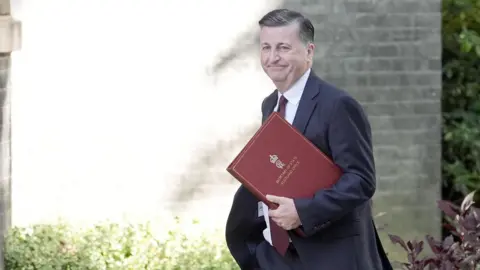 PA Media
PA MediaWhat seems remarkable to me is that the first minister was able to develop this strategy under the noses of UK Labour ministers without any obvious challenge.
They enabled him to run rings round them.
The new UK Business Secretary Peter Kyle was in Washington talking tariffs the day before John Swinney, yet his department struggled to produce a statement for days.
Perhaps the administration was distracted by the reshuffle following the resignation of Deputy Prime Minister Angela Rayner or the emerging crisis surrounding Lord Mandelson.
Eventually, the new Scottish Secretary Douglas Alexander took to the airwaves to insist that the UK government had been “thinking, working, talking and negotiating about whisky for many weeks and months”.
He argued that whisky was “very high” up the list of priorities for the UK as it seeks further trade concessions from the US and warned Swinney against “playing politics”.
There is no certainty that whisky will get a special deal or that any announcement will come during Trump’s state visit – but the industry has sensed in recent weeks that a better deal for them could be “deliverable”.
They would raise a glass to that if it happens and leave the politicians to squabble over who fought Scotch’s corner the hardest.
